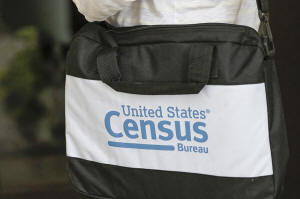DOGE targets Census Bureau, worrying data users about health of US data
infrastructure
[May 23, 2025]
By MIKE SCHNEIDER
The group run by Elon Musk and his aides to cut federal spending in the
second Trump administration is targeting some surveys conducted by the
U.S. Census Bureau it claims are “wasteful," worrying users of federal
data already concerned about the health of the nation's statistical
infrastructure.
The Department of Government Efficiency said on social media this week
that five surveys costing $16.5 million that are conducted by the
statistical agency for other federal agencies have been “terminated” but
didn't specify which ones. Some of the questions on the eliminated
surveys asked about alcohol consumption and the frequency that
respondents used the internet in their home, according to the post.
Other surveys are being reviewed “one-by-one,” said Tuesday's post on
DOGE's X account. The Census Bureau didn't respond this week to an
inquiry seeking comment.
Based on the post, it's highly possible that the eliminated surveys
included the Survey of Inmates in Local Jails, which gathered
information on inmates for the Department of Justice, and the Ask U.S.
Panel, an internet survey conducted with the Department of Defense, said
Beth Jarosz, a senior program director at the Population Reference
Bureau, a nonpartisan research organization.
There is a public process for changing government surveys that involves
giving notice and seeking public comment, and anything that is canceled
without going through that process may be violating the law, Jarosz
said.

“These data belong to the public,” Jarosz said. “The taxpayers paid for
the data and they should get the data unless they don't want it to be
collected anymore.”
The Census Bureau asks the public survey questions in order to help
Congress and federal agencies implement laws or develop policies, said
Terri Ann Lowenthal, a former congressional staffer who consults on
census issues.
“Just picking isolated questions doesn’t make any point DOGE has
intended to make, which is, I guess, that the Census Bureau isn’t doing
serious work or necessary work, which they are,” Lowenthal said. “I
think that tweet suggests the DOGE staff has very little knowledge about
data collection and the set purpose of the Census Bureau's mission.”
The bigger concern is whether the Census Bureau is going to be ready for
test run-throughs next year of the once-a-decade census, given federal
government hiring freezes by the Trump administration and public silence
from the bureau about the schedule, Lowenthal said.
[to top of second column]
|

A census taker carries a briefcase as she knocks on the door of a
residence in Winter Park, Fla., Aug. 11, 2020. (AP Photo/John Raoux,
File)

Tests next year for the 2030 census are slated for six places:
western Texas; tribal lands in Arizona; Colorado Springs, Colorado;
western North Carolina; Spartanburg, South Carolina; and Huntsville,
Alabama. The census is used to determine how many congressional
seats each state gets and helps guide the distribution of $2.8
trillion in annual federal funding.
“The time lost in planning for a census can’t be made up easily, if
at all,” Lowenthal said. “The timeline of a census is very tight.
Each step builds upon what has been done previously.”
Researchers and users of federal data are grappling with broader
concerns about the health of the U.S. statistical system, given
disruptions to federal agencies by DOGE that have led to canceled
contracts and the departures of longtime staffers with vast
institutional knowledge, Georgetown professor Amy O'Hara, president
of the Association of Public Data Users, said during a recent online
forum.
For instance, the Census Bureau's roster of top leaders and their
staff showed 18 vacancies as of the beginning of the month. The
statistical agency's leader, Ron Jarmin, has been filling the job in
an “acting” capacity since Census Bureau director Rob Santos
resigned earlier this year.
An Inspector General's report last March warned that the bureau has
had difficulties hiring and retaining workers to carry out its
surveys. Earlier this year, the Commerce Department, which oversees
the Census Bureau, eliminated advisory committees made up of
demographers, statisticians and advocacy group leaders who provided
expertise to the statistical agency.
“There's a lot of anxiety. There's a lot of frustration because
information is potentially threatened due to changes in agencies or
changes in programs,” O'Hara said. “There's just this fear that what
you had relied on is not going to be available.”
All contents © copyright 2025 Associated Press. All rights reserved
 |